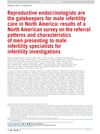
Search
for
Sort by
Research
30-60 / 206 results

research Androgen Receptor Gene Polymorphism (SNP RS6152) – Its Relationship to Androgen-Sensitive Genes Expression in Benign Prostatic Hyperplasia, Carcinoma of the Prostate, and Androgenetic Alopecia
Gene variation affects prostate issues and hair loss.

research Standards of Care for the Health of Transsexual, Transgender, and Gender-Nonconforming People, Version 7
The guidelines recommend informed consent for gender-affirming treatments and stress the importance of personalized, culturally sensitive care for transgender individuals.

research The Effect of Finasteride on the Risk of Acute Urinary Retention and the Need for Surgical Treatment Among Men with Benign Prostatic Hyperplasia
Finasteride reduces urinary issues and surgery need in men with enlarged prostates by over 50%.

research Congenital Adrenal Hyperplasia: Current Insights in Pathophysiology, Diagnostics, and Management
Early diagnosis and individualized treatment improve outcomes for Congenital Adrenal Hyperplasia.

research Sex Differences in SARS-CoV-2 Infection Rates and the Potential Link to Prostate Cancer
Men, especially older ones with health issues like prostate cancer, may have worse COVID-19 outcomes and could benefit from therapies targeting male hormones.

research Urinary Retention in Patients with BPH Treated with Finasteride or Placebo Over 4 Years
Finasteride lowers risk of urinary issues and surgery by over 50% in 4 years.

research Pharmacology of Antiandrogens
Antiandrogens affect androgen-dependent body functions and are used for various medical conditions, with some risks like fetus feminization, but new forms like 17α-propylmesterolone show promise for acne without systemic effects.

research Finasteride
Finasteride treats enlarged prostate, shrinks it, improves urination, but may cause sexual dysfunction and isn't for women or children.

research Adverse Effects of Common Medications on Male Fertility
Some common medications can harm male fertility, but many effects can be reversed.

research Emerging Medication for the Treatment of Male Hypogonadism
New treatments for male hypogonadism are effective and should be personalized.

research The E211 G>A Androgen Receptor Polymorphism Is Associated With a Decreased Risk of Metastatic Prostate Cancer and Androgenetic Alopecia
E211 G>A gene linked to lower risk of severe prostate cancer and hair loss.

research Prostate Cancer Prevention
Prostate cancer prevention includes diet changes, supplements, and medications, with more answers expected soon.

research Semen Parameters Among Transgender Women With a History of Hormonal Treatment
Hormonal treatment in transgender women reduces semen quality, but stopping treatment may improve it.

research What Do We Know About Phytotherapy of Benign Prostatic Hyperplasia?
Some plant-based treatments can help with benign prostatic hyperplasia symptoms, but more research is needed to confirm their safety and effectiveness.

research Significance of the Polyglutamine Tract Polymorphism in the Androgen Receptor
The length of the CAG repeat in the androgen receptor gene affects the risk and progression of prostate cancer, BPH, infertility, and undermasculinized genitalia.

research Finasteride
Finasteride treats enlarged prostate, improves urinary flow, but may cause sexual side effects.

research Efficacy and Side Effects of Drugs Commonly Used for the Treatment of Lower Urinary Tract Symptoms Associated With Benign Prostatic Hyperplasia
Different drugs for prostate-related urinary symptoms work but have various side effects, and treatment should be tailored to the individual.

research Clinical Applications of Antiandrogens
Antiandrogens are effective for conditions like prostate cancer and skin issues, but more research is needed to confirm their benefits and minimize side effects.

research Reproductive Endocrinologists Are the Gatekeepers for Male Infertility Care in North America: Results of a North American Survey on the Referral Patterns and Characteristics of Men Presenting to Male Infertility Specialists for Infertility Investigations
Reproductive gynecologists are the main referrers for male infertility evaluations in North America.

research Economic Analysis of Finasteride: A Model-Based Approach Using Data from the Proscar Long-Term Efficacy and Safety Study
Finasteride is a cost-effective option for treating BPH, reducing risk of urinary issues and surgery.

research Clinical Risk Factors Associated with Intraoperative Floppy Iris Syndrome: A Prospective Study
Taking tamsulosin or finasteride and being older increase the risk of floppy iris during cataract surgery.

research Association Between Testicular Microlithiasis and Primary Malignancy of the Testis: Our Experience and Review of the Literature
Testicular microlithiasis may increase the risk of testicular cancer and patients with it should be closely monitored.

research The 2018 Revision to the Process of Care Model for Evaluation of Erectile Dysfunction
The 2018 update to the ED care model added a new severity score and stressed a detailed evaluation of both physical and psychological aspects.

research The Pathophysiology of Delayed Ejaculation
Delayed ejaculation is a complex issue caused by psychological, biological, and lifestyle factors, requiring a holistic treatment approach.

research Discontinuation of Alpha-Blockade After Initial Treatment With Finasteride and Doxazosin for Bladder Outlet Obstruction
Stopping alpha-blocker medication after 6-9 months is safe and effective for most patients with bladder outlet obstruction.

research Risk Factors for Male Lower Urinary Tract Symptoms: The Role of Metabolic Syndrome and Androgenetic Alopecia in a Latin American Population
Metabolic syndrome linked to urinary symptoms; hair loss not significant.

research Post-Finasteride Syndrome: An Induced Delusional Disorder with the Potential of a Mass Psychogenic Illness?
PFS might be a delusional disorder with potential to become mass psychogenic illness.

research Does Finasteride Have a Preventive Effect on Chronic Bacterial Prostatitis? Pilot Study Using an Animal Model
Finasteride may help prevent chronic bacterial prostatitis, with better results when combined with antibiotics.
